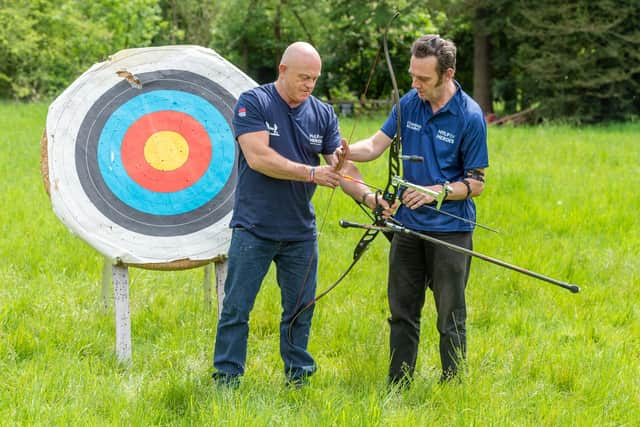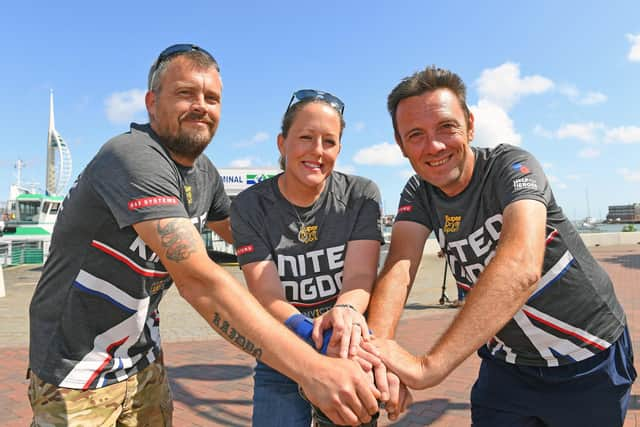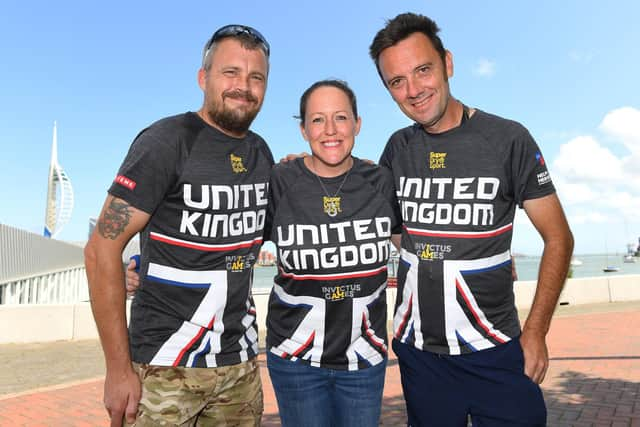Gosport Royal Navy veteran joins Ross Kemp in calling on film industry to change how it portrays troops with PTSD
and live on Freeview channel 276
Courageous Jay Saunders, from Gosport, is speaking out about his battle to overcome PTSD as part of a nationwide effort by forces charity, Help For Heroes, led by former Eastenders star Ross Kemp.
The campaign aims to highlight how military heroes’ lives are blighted by damaging portrayals of mental health conditions suffered by veterans in films and on TV.


Advertisement
Hide AdAdvertisement
Hide AdHelp for Heroes says storylines often portray veterans as ‘broken’, angry and unable to fit into society because their PTSD is making lives for Britain’s military heroes more difficult.
For 52-year-old Jay, the impact of his condition has changed his life - and ultimately ended his 23-year career with the Senior Service.
It all started in December 2014, when he was sent at short notice to Freetown in Sierra Leone to help deal with the Ebola epidemic.
For Jay it was a terrible deployment that went from bad to worse, starting off with being arrested by the police as soon as he arrived due to a mess up with the paperwork, and then being sent to one of the poorest and most badly affected areas of the country for Ebola.


Advertisement
Hide AdAdvertisement
Hide AdIt was a chaotic and dangerous time, with Jay coming into close contact with the disease – which at the time had a 100 per cent fatality rate at the time – a number of times, including when one of his comrades, who had Ebola, vomited on him
When he came home after three months, Jay had no idea of how much the experiences had changed him.
He thought he was fine but soon started feeling like he was going mad, unable to explain his thought processes or behaviour.
Eventually he was diagnosed with complex PTSD and in 2019 he was medically discharged from the navy.


Advertisement
Hide AdAdvertisement
Hide AdJay was given support by Help for Heroes and qualified as an archery coach, supporting his local club and helping to train RAF veteran Sherry McBain, who just competed in this year’s Invictus Games and won a gold medal in.Despite his battle to recover, Jay said he –and so many of his colleagues with PTSD – constantly faced an uphill battle of acceptance from society.
And he said the ‘unfair’ portrayal of troops with mental health issues on TV and in movies was only making things tougher.
He said: ‘Veterans are always stereotypical in TV dramas and in films – especially those with PTSD. They are automatically a danger to society, a loner who can’t socially interact. They’ll wear drab olive clothes, hit the bottle, and turn to violence.
‘This may be true for a minority of people with PTSD, but it’s not how I experience it. If I’m triggered, I shut down into a zombie-like state and end up curling up in a foetal position.
Advertisement
Hide AdAdvertisement
Hide Ad‘Indeed, everyone with PTSD will experience it in different ways, but on screen it is always the same stereotype – so production companies and writers need to show a much bigger picture of what PTSD can look like.
‘It’s always very different from the way they write about any other member of society who has PTSD, such as a medical health worker.
‘That’s the perception that’s out there, that veterans with PTSD, when they get triggered or get agitated, they will automatically turn to violence.
‘When I was using an online dating app I told someone I had PTSD and they said that they would report me as they believed people with PTSD are a risk to women.
Advertisement
Hide AdAdvertisement
Hide Ad‘For me, this shows the importance of myth-busting the clichés to change this kind of misconception and unfairness.’
An investigation carried out by Help for Heroes revealed how misconceptions about veterans, perpetuated in the media, are having a direct and detrimental impact on veterans’ relationships, careers, and self-esteem.
A total of 87 per cent of veterans, who responded to the charity’s survey, said inaccurate portrayals on screen are likely to make the public think military veterans with mental-health issues will do something reckless or dangerous.
A responder to the survey said: ‘Mostly, veterans are portrayed as mad, dangerous losers with nothing to live for or to offer society, which I think is disgusting as 99 per cent of veterans are peaceful people.’
Advertisement
Hide AdAdvertisement
Hide AdThe fallout has led to some veterans to not being able to get a job after a PTSD diagnosis, being unable to get life insurance or a mortgage after revealing they have PTSD to even being banned from joining an art course because colleges believed the demands would be ‘too stressful’.
Ross Kemp, who has portrayed a veteran with mental-health issues on screen, when playing the character of Grant Mitchell, in Eastenders, said: ‘What you see on screen is only one tiny element of what illnesses like PTSD can look like, and not all veterans have mental-health issues.
‘I had no idea, until I talked to veterans who have mental health conditions, just how damaging the on-screen stereotypes are to them.’
Colin Preece, psychological wellbeing manager at Help for Heroes, said ‘Damaging veteran stereotypes portray characters that our veterans cannot recognise and don’t want to be associated with – this can prevent them from taking that first step in asking for help and moving on to lead a better life.
‘By challenging the misconceptions that people have about veteran mental health, we hope to drive a process of levelling up and making the world a more equal place for veterans.’
Comment Guidelines
National World encourages reader discussion on our stories. User feedback, insights and back-and-forth exchanges add a rich layer of context to reporting. Please review our Community Guidelines before commenting.